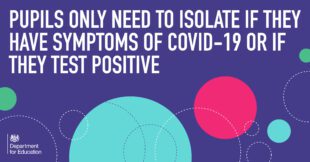
This article contains out of date information about Covid-19 in schools. We no longer recommend routine testing. Please visit this link for up-to-date information.
Pupils have returned to schools and colleges for the autumn term. There are fewer restrictions and pupils are now able to experience a fuller education experience.
That means no more bubbles and no isolating unless pupils have symptoms or have tested positive for Covid-19. Here we answer your questions.
When do children need to isolate?
Children need to self-isolate if they have any of these 3 symptoms of COVID-19, even if they are mild:
- a high temperature
- a new, continuous cough
- a loss or change to their sense of smell or taste.
If your child has any of the above, they should self-isolate straight away and get a PCR test (a test that is sent to the lab) on GOV.UK as soon as possible.
Children should also self-isolate if:
- they’ve tested positive for COVID-19 – this means they have the virus
- they’ve been told to self-isolate by NHS Test and Trace following contact with someone who tested positive – find out what to do if you're told to self-isolate by NHS Test and Trace or the NHS COVID-19 app.
If they develop symptoms or get a positive LFD test, they should book a PCR test. If a pupil is asked to get a PCR test if they are identified as a close contact by NHS Test and Trace, they may continue to attend education until they get the result of their PCR back.
If a child lives with someone who has tested positive, they should continue to go to school.
So, what if my child has been in contact with a confirmed case?
Individuals are not required to self-isolate if they live in the same household as someone with COVID-19, or are a close contact of someone with COVID-19, and any of the following apply:
- they are fully vaccinated
- they are below the age of 18 years and 6 months
- they have taken part in or are currently part of an approved COVID-19 vaccine trial
- they are not able to get vaccinated for medical reasons.
Instead, they will be contacted by NHS Test and Trace, informed they have been in close contact with a positive case and advised to take a PCR test. We would encourage all individuals to take a PCR test if advised to do so. They do not need to isolate while awaiting the PCR test.
Staff who do not need to isolate, and children and young people aged under 18 years 6 months who usually attend school, and have been identified as a close contact, should continue to attend school as normal.
If none of the above applies, people should self-isolate as per the instructions from NHS Test and Trace.
But what if there’s a case in my child’s class? Are bubbles still in operation?
No. If there has been a case in your child’s class, you will be contacted by NHS Test and Trace, informed your child has been in close contact with a positive case and advised to take a PCR test. Your child does not need to isolate while awaiting the PCR test.
We would encourage all individuals to take a PCR test if advised to do so.
What about attendance?
Children have already faced disruption to their education as a result of the pandemic. Experts agree that it is important for young people go back to schools and colleges for a range of reasons and it remains crucial that they have as normal an experience as possible.
School attendance is mandatory for all pupils and the usual rules on school attendance apply.
You can read more about the importance of keeping schools open in our recent post here: Back to School: Experts underline the importance of minimising disruption in schools - The Education Hub (blog.gov.uk).